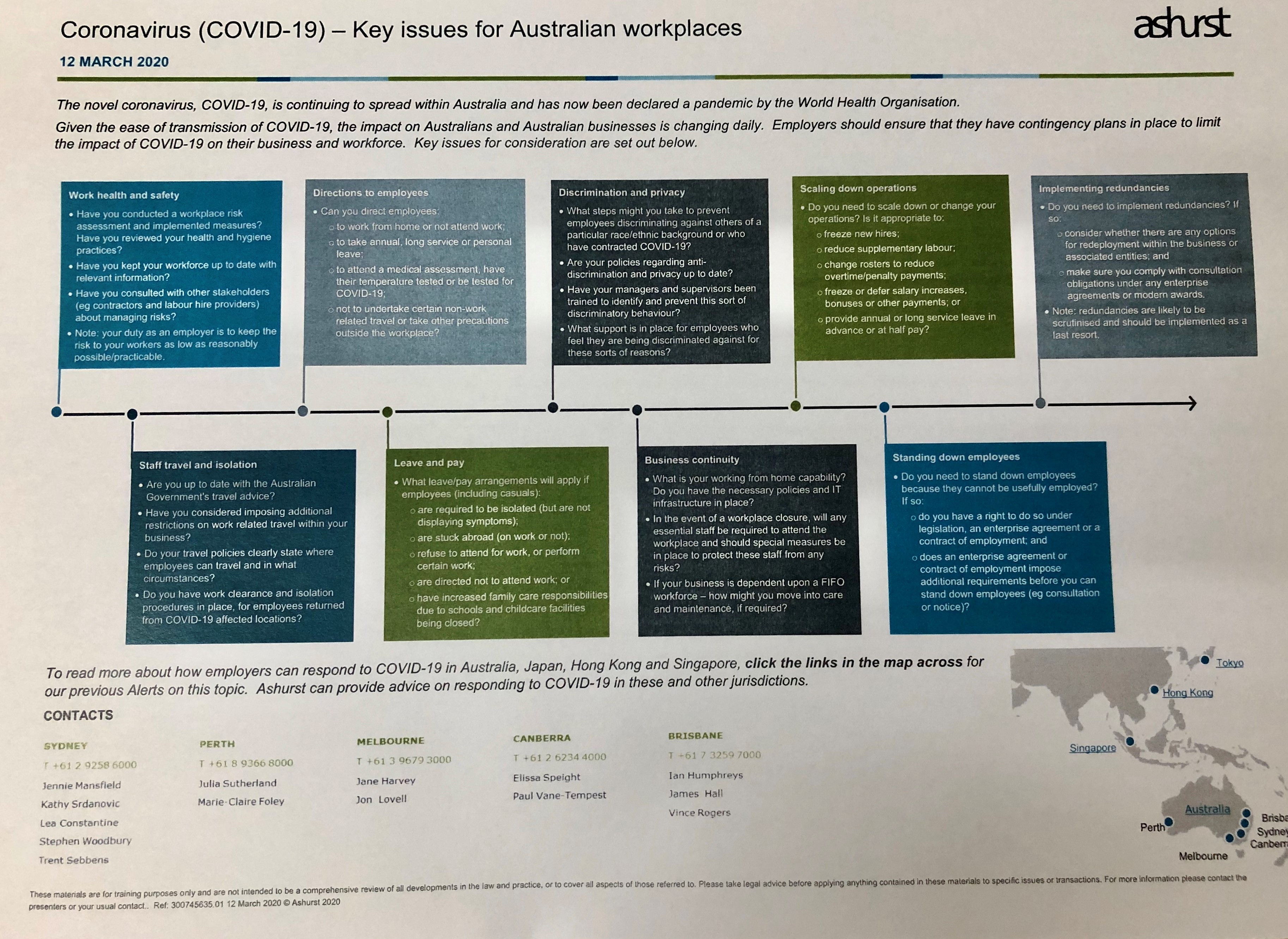At the time of writing there are no confirmed cases of Covid-19 in Fiji (following publication of this guidance, Fiji confirmed its first case on 19 March 2020). However the effects of the Covid-19 pandemic are being felt in Fiji and particularly in the tourism sector. Through urgent action to prioritise public health that includes stringent measures to limit contact between people, certain countries or regions have been able to control the spread of Covid-19. However, the economic consequences of these sensible measures have been severe and sudden.
It is uncertain how long this period of economic downturn will last, and in this time businesses will have to adapt to survive by exploring innovative options that may include more remote working, less person to person meetings and individuals taking more responsibility to safeguard one another. Employers also have a duty to provide a safe working environment.
In this legal bulletin we provide general guidance from an employment perspective to assist employers and employees to do what they can to minimise the effects of the economic downturn and work within the requirements of Fiji employment law. This is provided from our firm as a small contribution to the current situation and while we hope it is of assistance, please note that it is provided for general guidance purposes only, and it is not intended to be, and nor should it be taken as, a substitute for legal advice.

In the extraordinary, tragic and difficult situation of the current pandemic employers and employees should be working together in good faith to prioritise the health and safety of themselves and their families. At the same time, they should also ensure that, as far as possible, the employer’s businesses or company is able to keep operating, and continues to offer employment to as many employees as possible.
For any business the key issue is sufficient cash flow to meet expenditure, and for employees the concern is that they will receive regular payment during any period of sudden economic downturn and disruption.
The onus, however, is on the employer to lead with a plan, as it is generally only the employer who has access to all of the information relating to the business. For larger employers, for example, where there is a senior management group, it is sensible for the plan to be agreed at this leadership level to ensure that any particular issues can be discussed, the plan refined, and also to ensure that the leadership group within the employer has considered how to discuss the plan sensitively with employees.
In implementing the plan the employer should consult with the employees, because if any changes to the terms of employment are required, including work hours and pay, these changes can be made by agreement. If the employees are part of a union then any plan should also be discussed with the union too, and reference should be made to the collective agreement.
In our view, and given that Fiji citizens are well informed and updated about the status of the pandemic, some suggested steps for any employer in the current situation are:
Step 1 – start discussions with your employees on the basis of reliable information
Based on reliable information, the employer should start discussions on the current situation with all employees, and set out what the employer is proposing to do to safeguard employment, and why.
If the plan means that changes will have to be made, the employer should set out what changes to salary/working hours are proposed, when they will become effective and discuss these proposed changes with all employees concerned, and union, (where applicable).
It may assist the employer if the leadership group (those in management positions) also show leadership and ensure that the changes also apply to them. This approach can demonstrate to all employees that everyone is facing the same situation together.
Step 2 – ensure that next steps are also explained
The employer may explain what the next steps are over the coming weeks and months. It is understood that there are uncertainties, so these next steps may be in broad terms. But the message could be that the business situation will be kept under constant review, and further decisions will be taken both on cash flow and other changing circumstances.
It may be explained that further changes could become necessary to safeguard cash flow and ensure the company/employer continues to operate and to be able to continue to offer employment. The employer should also explain (politely and sensitively) the reality including the potential consequences of non-agreement to any proposed changes.
The employer may explain that if employees do not agree, or as a last resort (if things don’t improve) it may become necessary to terminate employment contracts in accordance with the Employment Relations Act. It is incumbent on employers to check their employment contracts carefully to ensure that they comply with any notice provision in the contract. Further, in accordance with the Employment Relations Act, all employers will have to provide a reason in writing to the employee and comply with all other terms of the Act. In terms of the reason for the termination, it is likely to be because the employer is not able to afford to continue to employ that person on the same terms and conditions or it may decide to undertake a redundancy process.
Of the two potential options for terminations, either via written notice or via redundancy process, our view is that the more straightforward and transparent method is the termination of employment because the employer cannot afford to continue to employ the employee on the same terms and conditions and the employee would not agree to varied terms and conditions. However, all employers must remember that they have a duty to act in good faith and ensure that this reason is not only valid but that they can also show that it is valid. In addition, all employers must follow all other requirements in the Employment Relations Act which include, but are not limited to, providing all money owing to the employee.
Step 3 – agree solutions with the employee
Once the above steps have been taken, the employer should seek to agree with the employee (and union where applicable) a number of options that may include a reduction in salary and/or a reduction in hours/days worked per week. This agreement should record that it is made in good faith and is subject to regular updates based on the principles of transparency. In other words as things improve the employer will work to return the employee’s terms and conditions to normal.
Conclusions
We hope that this guidance is of use. Our approach is to encourage employers and employees to discuss the current situation openly and transparently and do everything possible to work together in good faith to find solutions that provide the best chance of adaptation to the current economic situation.
This guidance has not addressed the duty of the employer to comply with occupational health and safety requirements and other employment law requirements. Employers should also bear these duties in mind. In the current context, this may include, but is not limited to providing:
- Information on hand washing
- Adequate facilities
- Employees with the opportunity to voice and discuss any concerns, issues or grievances
- Sufficient space to be able to work safely and in accordance with current medical guidance (unfortunately the new normal may require greater space between employees).

A copy of guidance provided by Australian law firm Ashurst - www.ashurst.com
Please note this legal update is provided for guidance purposes only, and it is not, and nor should it be taken as, a substitute for legal advice



